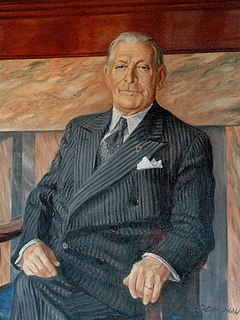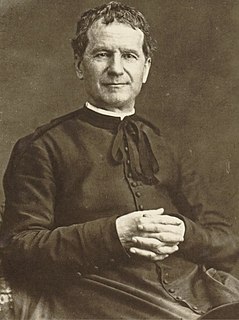A Quote by John Vianney
We ought to run after crosses as the miser runs after money. . . Nothing but crosses will reassure us at the Day of Judgment When that day shall come, we shall be happy in our misfortunes, proud of our humiliations, and rich in our sacrifices!
Related Quotes
Let none falter who thinks he is right, and we may succeed. But if, after all, we shall fail, be it so: we still shall have the proud consolation of saying to our consciences, and to the departed shade of our country's freedom, that the cause approved of our judgment and adored of our hearts, in disaster, in chains, in torture, in death, we never faltered in defending.
Whatsoever is good for God's children they shall have it, for all is theirs to further them to heaven; therefore, if poverty be good, they shall have it; if disgrace be good, they shall have it; if crosses be good, they shall have them; if misery be good, they shall have it; for all is ours, to serve for our greatest good.
I anticipate the day when to command respect in the remotest regions it will be sufficient to say I am an American. Our flag shall then wave in glory over the ocean and our commerce feel no restraint but what our own government may impose. Happy thrice happy day. Thank God, to reach this envied state we need only to will. Yes my countrymen. Our destiny depends on our will. But if we would stand high on the record of time that will must be inflexible.
Time will pass, and we shall go away for ever, and we shall be forgotten, our faces will be forgotten, our voices, and how many there were of us; but our sufferings will pass into joy for those who will live after us, happiness and peace will be established upon earth, and they will remember kindly and bless those who have lived before.
Let us, at any rate, give heed to suffer joyfully the crosses that God sends us, because they all, if we are saved, will become for us eternal joys. When infirmities, pains, or any adversities afflict us, let us lift up our eyes to heaven and say, "One day all these pains will have an end, and after them I hope to enjoy God forever."
For, after all, put it as we may to ourselves, we are all of us from birth to death guests at a table which we did not spread. The sun, the earth, love, friends, our very breath are parts of the banquet.... Shall we think of the day as a chance to come nearer to our Host, and to find out something of Him who has fed us so long?
On the Way of the Cross, you see, my children, only the first step is painful. Our greatest cross is the fear of crosses. . . We have not the courage to carry our cross, and we are very much mistaken; for, whatever we do, the cross holds us tight - we cannot escape from it. What, then, have we to lose? Why not love our crosses, and make use of them to take us to heaven?
Our very success, gained you will agree by skill, will draw more people than ever to see it. And that will benefit many more clubs than Rangers. Let the others come after us. We welcome the chase. It is healthy for us. We will never hide from it. Never fear, inevitably we shall have our years of failure, and when they arrive, we must reveal tolerance and sanity. No matter the days of anxiety that come our way, we shall emerge stronger because of the trials to be overcome. That has been the philosophy of the Rangers since the days of the gallant pioneers.
Only part of us is sane: only part of us loves pleasure and the longer day of happiness, wants to live to our nineties and die in peace, in a house that we built, that shall shelter those who come after us. The other half of us is nearly mad. It prefers the disagreeable to the agreeable, loves pain and its darker night despair, and wants to die in a catastrophe that will set back life to its beginnings and leave nothing of our house save its blackened foundations.
Perhaps the whole root of our trouble, the human trouble, is that we will sacrifice all the beauty of our lives, will imprison ourselves in totems, taboos, crosses, blood sacrifices, steeples, mosques, races, armies, flags, nations, in order to deny the fact of death, the only fact we have. It seems to me that one ought to rejoice in the fact of death - ought to decide, indeed, to earn one's death by confronting with passion the conundrum of life.
Health is God's great gift, and we must spend it entirely for Him. Our eyes should see only for God, our feet walk only for Him, our hands labor for Him alone; in short, our entire body should serve God while we still have the time. Then, when He shall take our health and we shall near our last day, our conscience will not reproach us for having misused it.
I perceive we postpone all our joys of Christ, till He and we be in our own house above, thinking that there is nothing of it here to be sought or found, but only hope and fair promises; and that Christ will give us nothing here but tears, sadness, crosses; and that we shall never feel the smell of the flowers of that high garden of paradise above, till we come there. Nay, but I find it possible to find young glory, and a young green paradise of joy even here. We dream of hunger in Christ's house, while we are here, although He alloweth feasts to all the bairns within God's household.
We Aryans are those of European descent who are racially conscious and who have committed our lives to our people's survival and evolutionary advancement. We shall do our duty. We shall not surrender our freedom and our very existence to Jewish or any other power. We shall preserve our heritage and our hard-won rights and freedoms. We shall guide our people up the evolutionary stairway to the stars.
From this day to the ending of the world, But we in it shall be remembered- We few, we happy few, we band of brothers; For he to-day that sheds his blood with me Shall be my brother; be he ne’er so vile, This day shall gentle his condition; And gentlemen in England now-a-bed Shall think themselves accurs’d they were not here, And hold their manhoods cheap whiles any speaks That fought with us upon Saint Crispin’s day.





































